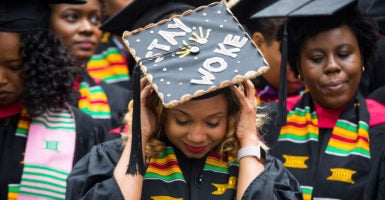Integration used to be a major goal of the civil rights movement. But today, in many places, resegregation is the growing trend—particularly on college campuses. A new National Association of Scholars report finds that 7 out of 10 colleges surveyed are having separate graduations for those of certain racial or ethnic backgrounds. Dion Pierre of the National Association of Scholars joins us to discuss. Read the interview, posted below, or listen to the podcast:
We also cover these stories:
- President Donald Trump is expected to tap Ken Cuccinelli for a top immigration job.
- According to a new Gallup poll, 4 in 10 Americans embrace some form of socialism.
- Alabama’s public television network refuses to air children’s TV show episode featuring same-sex wedding.
The Daily Signal podcast is available on Ricochet, iTunes, SoundCloud, Google Play, or Stitcher. All of our podcasts can be found at DailySignal.com/podcasts. If you like what you hear, please leave a review. You can also leave us a message at 202-608-6205 or write us at [email protected]. Enjoy the show!
Katrina Trinko: Joining us today is Dion Pierre, a research associate at the National Association of Scholars. You recently wrote an op-ed for The College Fix, which was really fascinating. I’m just going to read a portion of it now.
“At the National Association of Scholars, we surveyed 173 colleges and universities across the country, and found that 71%—125 of them—have some version of an ethnically separate graduation. In fact, Harvard also has a separate ‘Latinx’ graduation. Brown has its ‘Blackalaureate.’ Columbia has both ‘Black Graduation’ and ‘Raza Graduation.’ These ceremonies are held in addition to the mainstream, campus-wide commencements and attendance is voluntary, but they’re so popular nowadays most students take them for granted.”
Tell us, what’s going on? Why have these race-specific graduation ceremonies become so popular?
Dion Pierre: Boy, it’s really unfortunate, but one of the reasons is that colleges are increasingly ethnically balkanized, and this has been going on for some time without the public finding out about it.
Daniel Davis: Has it kind of been a reverse trend? Since we’ve had integrated institutions, has there been a re-segregation over time?
Pierre: There has been a re-segregation. The re-segregation, though, began much sooner than most people realize. Fifteen years after Brown vs. Board of Education, the first black students to enter the Ivy League in the late ’60s were demanding segregated housing, segregated orientation programs, essentially what we understand to be a segregated admissions track system. And it has persisted ever since.
Segregated graduation ceremonies are a relatively new form of this trend, but some of them go back 10 or 20 years. But it’s kind of the penultimate stage of neo-segregation.
Students go through a diversity fly-in, a segregated orientation program, like Cultural Connections at Yale University, then they’re involved in all kinds of identitarian stuff throughout college, and the segregated graduation ceremony sort of puts the final touch on the neo-segregated college experience. Students will then, after the segregated graduation ceremonies, be inducted into segregated alumni groups.
Trinko: You’ve wrote that you yourself would never participate in this kind of ceremony. First off, are you a minority yourself? And if so, why do you find this idea so offensive?
Pierre: Am I a minority? I’m an American. I’m an American who has both white blood, black blood, Hispanic blood, and South Asian blood in me. If people were to ask, I guess I’d say that I’m black. But I wouldn’t attend one of these ceremonies, particularly because my best friend in college is white. I wouldn’t have been able to see him at graduation or sit with my friends at graduation.
The idea is just so foreign to me. There doesn’t seem to be anything particularly special about graduating college because you’re of a particular race. I just reject that concept all together.
Davis: Well, in your piece, you also write that, and I’m quoting now, “The word diversity is now invested with meanings that have nothing to do with actual diversity.” That’s a really interesting thought there. I’d like you to just expand on that.
Pierre: Yes. Diversity, in our minds, would mean that people are mixing, that students of different races are coming together and having conversation, studying together, going to the same parties. But diversity, as it’s practiced on college campuses, actually means race nationalism. I hate to be so forward about it, but when you hear someone say that a segregated house promotes diversity on campus, they’re just lying to you.
I’m not even sure that college administrators and students are genuinely thinking that these programs create diversity. They just say that it does because it gets people to stop asking questions about what these programs are for.
If you were to look at the description of the segregated house, it would say something like, “Oh, this is to celebrate the African diaspora.” If you were to look at a description of a segregated commencement ceremony, it would say, “This is for the celebration of black students, black excellence.”
If you were to look through some of the newspaper archives of college newspapers and brief yourself on the actual statements black students made in the debate over these programs, you would see that they wanted these programs for the purpose of self-segregation, they wanted these programs so that they could promote a form of race-nationalism that became popular in black America in the ’60s.
Diversity has become this kind of first resort argument that everyone uses when there is some kind of special program made for minority students, and very simply, the universities are gaslighting the public.
Trinko: You also wrote that activist students and college administrators are trying to cultivate group consciousness among racial minorities. What did you mean by that?
Pierre: Group consciousness is the way that minority college students and college administrators get unsuspecting freshman to see themselves locked in a struggle for the fate of the country with white Americans.
The idea is that you’re supposed to believe that whites hate you, they dislike you, they don’t respect your accomplishments, they’re going to micro-aggress you—whites today, they have the same disdain for people of color that they did in, say, 1756.
And what that does is encourage students to self-segregate with other black students, or Latino students, or even Asian students, not just black students.
For instance, Cultural Connections, which is Yale’s segregated orientation program, it’s for minority students—non-white minority students—and when students go there, they are introduced to all of the aspects of neo-segregation at Yale.
They get a tour of the black cultural center, or Latino cultural center, black students go off to the African-American studies department, Latino students go off to some kind of meeting with the few Hispanic professors that might be on campus. They are also introduced to ethnic clubs. Yale has the Black Student Alliance. This is how this works.
Jacob Blecher, I think that’s how you pronounce his name, wrote an article way back in 2002 about Cultural Connections called “Cultural Engineering.”
And he then did Cultural Connections and observed that minority students attend this program for distinctly political purposes, and that purpose is getting minority students to see themselves collectively as an interest group on campus that has all of these segregated services, that has a special channel to people in the university to discuss racial matters.
That’s what these programs do. Group consciousness is all about turning minority students against the country, against whites, and to devote their studies and potentially the rest of their lives to reshaping the country into some kind of post-American world.
Davis: Yeah, so as you just explained, a lot of this seems geared toward preserving ethnic identity. And I wonder, do you think that they may be concerned or have a fear that if they do integrate fully into the majority, that they will lose their unique ethnic identity, or that it will be obliterated in that sense? And if so, how would you respond to that?
Pierre: I would say that this is the very dilemma that white Americans faced when blacks advocated civil rights and integration, well, in the 19th century and the 20th century. This is a sacrifice that people must be willing to make, and have to make, if we are going to have a unified society and a unified culture.
Now, this gets very difficult and complicated when it comes to the question of black Americans. When I was interviewing a student at Wesleyan University, she told me very frankly that there was a part of her which envied whites who are able to say, for example, that they trace their ancestry back to the Mayflower. This, in her mind, made her less American.
There’s a desire on the part of many black Americans, and African immigrants who become black Americans, to create a new identity. And it’s a product of American culture, it is Western, just like what they might say, but it gets very, very difficult for black Americans.
These are the same questions someone like Henry Cabot Lodge had in the late 19th century when he was opposing immigration from Southern Europe. Will the culture change? Will things be unrecognizable in 30 or 40 years?
And ultimately, people made the decision that we have to find a way to accommodate each other and to create a space in which Irish people can be respected, Scottish people, English people, Italians.
Blacks students in particular are going to have to figure out a way to assimilate to mainstream American culture while still preserving certain parts of themselves that are a part of American black culture.
It is important that blacks have a degree of identity because they, for the most part, black Americans, are the descendants of slaves who had the traces of their indigenous culture taken away from them. This affects people, and I can understand that.
If you are a decedent of Anglo-Americans, if you choose to look back—because I don’t think Americans look back so much—but if you choose to look back, you can say to yourself, “I am a descendant of Adam Smith, Lord Acton.”
If you’re French, you can look on French history, the revolution, Napoleon—those aren’t exactly highlights of French history, but the point remains.
If you’re Russian, you have Tolstoy, you have Turgenev.
Blacks want their Aristotle, their Plato, and you saw a desire for that in the ’60s when people were creating all of these new and weird academic programs, which intended to create a black epistemology. You saw blacks dropping their Anglo derivative names for ones that effected Levantine origin.
Now, the other side of that is that in creating a new black identity, loud black voices within the community began to reject what we would call middle-class norms, what Amy Wax got in trouble for calling bourgeois values.
And so, neo-segregation doesn’t just put black students and white students at odds with each other, it also teaches black students that the formula for success, used by Hispanic-Americans, Asian-Americans, and other minority groups in the country, is wrong, is based in racist ideology, etc.
What I would say to a black student who says that is that they have to really go back and study the ’60s very closely, so that they can discern when things kind of went off the rails. And things went off the rails when guys like Stokely Carmichael and Huey Newton came prominence, telling black Americans to reject Christianity, traditional values, capitalism, and the like. And the effect it’s had can be observed the last 50 to 60 years.
Look at what are the effects of telling black students, maybe from the time they’re in elementary school, not to read so-called white books. Only something like 24% of black students in the country are proficient in reading, and this persists despite the fact that something like 75% of black students graduate high school anyway, but they can’t read at a high school level.
And what happens if they get to college? They’re put in a remedial program, and then they’re sent to all of this sort of black nationalist stuff. It’s just a mess. It’s just a totally unworkable situation.
Trinko: You brought up, obviously, a lot of the problems, and we started this by discussing the racially segregated graduations that are cropping up. But do you think … I mean, we keep hearing about racial tensions in the media and it seems like, if anything, they’re on the rise in recent years. What do you think the answer is here? How do we get along better as a country?
Pierre: Boy, I’d like to say that Dr. King was the last Founding Father. He has to be rediscovered. That’s really the only solution. Well, at least one of them, the most important one for sure.
Dr. King really was able to get people to understand, I think maybe even slightly better than Lincoln, that our destiny as a country depends on us working past these things.
Black Americans, more than any other minority group in the country, have to keep to the liberal tradition that he espoused before he was assassinated in 1968. Because if black Americans say, “Well, you know what? We want race nationalism. We want segregation,” then it just opens the floodgates.
Every other minority group will agree to that, because it’s our nature to be tribal, to want to be around so-called people like us. But in order to sustain the American project, that instinct has to be overcome.
I don’t really have easy solutions for that, but I think that we could go a long way by rejecting the idea that whiteness equals wealth and privilege and status. Not every white person lives like the Bushes vacationing at Kennebunkport on the weekends.
Trinko: Definitely. I wish I lived that life.
Pierre: The white underclass and the black underclass probably have always had much in common culturally. It’s very much the case now.
You look at the rise of out-of-wedlock birthrates in the white underclass and you get frightened, at least I get frightened as a person who studied black American history in the 20th century.
When people begin to lose themselves culturally, when they begin to destroy the foundation of what keeps society stable, they begin to turn to unscrupulous leaders, demagogues.
And in black America, people began to turn to guys like Malcolm X. When did that happen? Right around the time the black out-of-wedlock birthrate began kicking upward, right around the time churches began reporting that black men were just missing, they didn’t know where they were, they were unemployed … and the result was that blacks wanted someone who gave them a narrative of what they were, a great people that has since lost its way and which needs to now find itself again in a transcended narrative that gives them some kind of special place in the world.
Donald Trump’s election in 2016 reminded me a little bit of how the conditions in which black America was headed in the ’60s were produced.
Trump, as we know, played to identity politics enough that it could raise eyebrows, not enough that it could derail his campaign. But if you look at the people who wanted to vote for him, where they were, you go to those towns. They’re not what they were 40 or 50 years ago.
People are on opioids, there’s no jobs, and they’re angry. In their minds, I think, the last 50 years of what the left called diversity and inclusion has been at their detriment, it has occurred to their detriment.
Trinko: Yeah, it’s definitely been a fascinating time in American politics. I think we’re going to need to wrap this up, Dion, but did you have a last thought?
Pierre: Yeah. I think that what students need now more than ever is to understand just how difficult it is to sustain a multiracial society.
And the last thing this country needs are teachers telling 18-year-olds that they are locked in a war with another racial group. And someone needs to step in and transmit a degree of self-awareness to these students, because I’m not sure that they realize how their race-nationalist ideology is being perceived by the public.
This is going to take the country to a very dark place if this kind of thinking leaks out into the broader polity.
Davis: Well, Dion, really appreciate your article at The College Fix, and thanks for joining us by phone to share your thoughts.
Pierre: Thank you.































